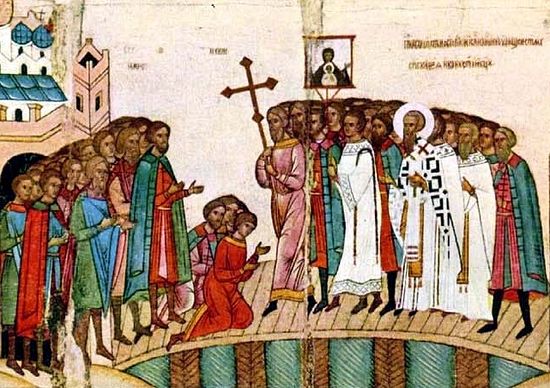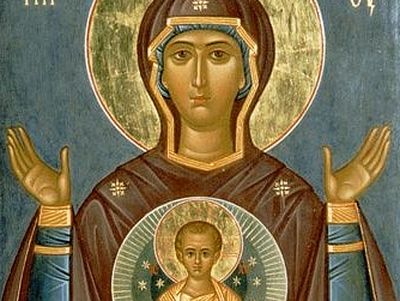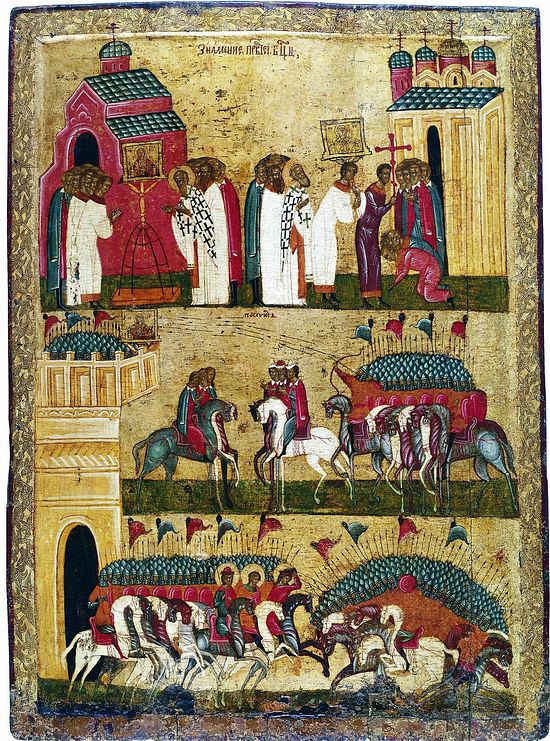 Icon of the battle between the Novgorodians and the Suzdalians. Fragment
Icon of the battle between the Novgorodians and the Suzdalians. Fragment
One of the most ancient iconographic images of the Mother of God, which has received in Rus’ the name, “ Novgorod ”Of the Sign” IconAs they were carrying the icon, the enemy loosed upon the procession a cloud of arrows, one of which struck the face of the Theotokos written upon the icon. From her eyes tears began to flow, and her icon turned to face the city. Immediately after the appearance of such a divine sign, the attackers were struck with an inexplicable terror, and began to strike down one another.
Novgorod ”Of the Sign” IconAs they were carrying the icon, the enemy loosed upon the procession a cloud of arrows, one of which struck the face of the Theotokos written upon the icon. From her eyes tears began to flow, and her icon turned to face the city. Immediately after the appearance of such a divine sign, the attackers were struck with an inexplicable terror, and began to strike down one another.
“>Of the Sign”, that is, a sign of the Theotokos’s mercy, began to be proliferated in Rus’ during the eleventh to twelfth centuries. Icons of this kind got this name after a miraculous sign that came from one of them in 1170 in Novgorod. At that time, a united force of Russian local princes was advancing on Novgorod, threatening to bring punishment upon the citizens’ heads. Not having the strength of arms to repel the attackers, the Novgorodians sought help from the Most Holy Theotokos, who then manifested her special miraculous intercessions through her miracle-working icon.
Such instances of miraculous help live long in people’s memories. And it must be said that there is a good reason for this. After all, every manifestation of God’s power is worthy of grateful memory. Miracles strengthen people’s faith, and are often an important argument in its favor for those who waver in the truth. However, there is also another side to divine signs and miracles. What sign shewest thou then, that we may see, and believe thee? (Jn. 6:30), as people asked the Lord after eating the bread and fish that He had miraculously multiplied. In reply to such demands the God-Man replied, sighing deeply in spirit, Why doth this generation seek after a sign? verily I say unto you, There shall no sign be given unto this generation (Mk. 8:12).
St. Isaac the Syrian the Bishop of NinevehSaint Isaac the Syrian, Bishop of Ninevah, lived during the sixth century. He and his brother entered the monastery of Mar Matthew near Ninevah and received the monastic tonsure.
“>St. Isaac the Syrian discussed this subject paradoxically. “If he who asks the Lord for a sign be heard,” says the saint, “then the evil one will find him to be man who walks before God without reverence, with audacity, and will then thrust him into great calamities.” That is, we are talking here not even about diabolic delusion, but about the danger that even true miracles can cause a person who begged for them long and hard from God! Here is a real danger in spiritual life, contained in the personal freedom that the Creator has bestowed upon His creation and does not limit. As it turns out, we can ask God for things that aren’t good for us and actually get them. And this is only possible only because, without having made sense of our own desires, without having timely tamed our perhaps good but nevertheless untimely strivings, we prefer our own world, contrived, tested, and demanded by us alone, over God’s world. And this is by no means the result of some negligence on the Creator’s part. The Lord talks about this in the parable of the Prodigal Son (cf. Lk. 15:11–32). A loving father gives his son what the latter demands from Him, fully aware of the dangers inheritent an unexperienced child’s independent life. Just the same, he cannot hold him back.
 Miracle of the icon of the Mother of God, “Of the Sign”. Battle of the Novgorodians with the Suzdalians. 15th c.
Miracle of the icon of the Mother of God, “Of the Sign”. Battle of the Novgorodians with the Suzdalians. 15th c.
Man is called in his earthly sojourn to recognize the taste of truth in life, and having experienced it, he will never choose the opposite. Our forefathers once chose that very experiential path of knowing the Truth; they did not believe the Creator’s word. Therefore, it is no surprise that we continue to test the borderline between darkness and light only by getting dangerously close to it, where we can feel that the path we’ve chosen is leading us in the wrong direction. The Lord cannot deprive us of this ontological necessity to test everything by our own experience. But in order to recognize the thin line between what is truly necessary for our life and what is untimely, between a good filial request of the Creator and an audacious demand for freedom and personal space, we must have a special spiritual taste; we must be able to recognize vainglory from a sincere desire to do good. This ability to discern spirits comes with time, after long labors and patience. This is the lot of the chosen. It’s better for us not to try to determine with our own minds the nature of spiritual phenomena through personal experience. There is no sense in trying out what is beyond the borderline of the close and familiar world (material and spiritual); no sense in asking for what would completely change the order and circumstances of our lives. The experience of the saints shows that it is better to thankfully trust God, to accept the circumstances of our lives as more or less conditioned upon the Creator’s good Providence for us. And then He will waste no time in taking away from us whatever is not beneficial to us. If circumstances really press us to turn to God for a miracle, then let this prayer have more contrition over our own infirmities than demands for justice or obligations from the Creator.